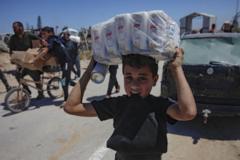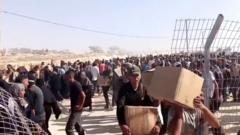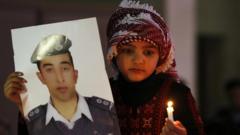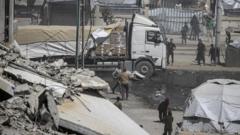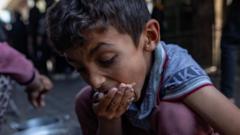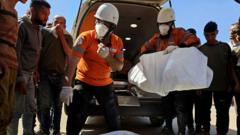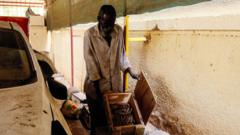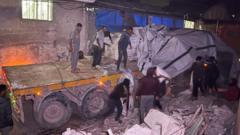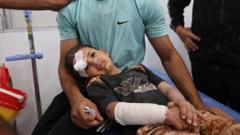As cholera cases surge in war-torn Sudan, the International Rescue Committee has declared the nation on the verge of a health crisis. The recent conflict has severely impacted health infrastructures, leading to increased fatalities and the spread of the disease among the population.
Sudan Faces Imminent Health Crisis Amid Cholera Outbreak
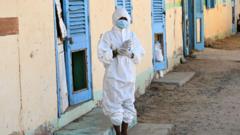
Sudan Faces Imminent Health Crisis Amid Cholera Outbreak
The International Rescue Committee warns that the ongoing civil war in Sudan is exacerbating a cholera outbreak, highlighting a significant humanitarian emergency.
Sudan's health situation has deteriorated sharply, with the International Rescue Committee (IRC) declaring the country "on the brink" of a health crisis due to a growing cholera outbreak. The Sudanese Health Ministry reports that 172 individuals have succumbed to cholera in just one week, predominantly in Khartoum state. Local medical sources attribute these issues partly to drone strikes causing power disruptions at water treatment facilities, forcing residents to rely on contaminated water sources.
Eatizaz Yousif, the IRC country director for Sudan, highlighted the adverse impact of the ongoing civil war, which has entered its third year, on public health, stating that it is "fuelling the resurgence of cholera." The IRC also pointed out that vaccination coverage against cholera is critically low, while essential medical supplies are depleting.
Doctors Without Borders (MSF) reported a concerning rise in suspected cholera cases, with thousands documented in Khartoum since mid-last month. MSF's medical coordinator, Slaymen Ammar, emphasized that the conflict has severely compromised the nation's healthcare system, with many facilities either closed or unaffordable. The few remaining health workers face overwhelming demand as they try to cope with the escalating crisis.
In the most alarming reports, as many as 500 new cholera cases appeared in a single day in Khartoum over the past week, with additional cases surfacing in northern and southern regions of Sudan. While some cholera patients exhibit mild symptoms, the disease can become life-threatening if it leads to severe dehydration requiring immediate medical intervention, as per guidance from the World Health Organization.
The broader context of Sudan's humanitarian crisis is grim, with over 150,000 fatalities attributed to the ongoing conflict between national forces and the Rapid Support Forces (RSF). The sustained violence has displaced millions, with the United Nations characterizing the situation as the world's most dire humanitarian emergency.
Eatizaz Yousif, the IRC country director for Sudan, highlighted the adverse impact of the ongoing civil war, which has entered its third year, on public health, stating that it is "fuelling the resurgence of cholera." The IRC also pointed out that vaccination coverage against cholera is critically low, while essential medical supplies are depleting.
Doctors Without Borders (MSF) reported a concerning rise in suspected cholera cases, with thousands documented in Khartoum since mid-last month. MSF's medical coordinator, Slaymen Ammar, emphasized that the conflict has severely compromised the nation's healthcare system, with many facilities either closed or unaffordable. The few remaining health workers face overwhelming demand as they try to cope with the escalating crisis.
In the most alarming reports, as many as 500 new cholera cases appeared in a single day in Khartoum over the past week, with additional cases surfacing in northern and southern regions of Sudan. While some cholera patients exhibit mild symptoms, the disease can become life-threatening if it leads to severe dehydration requiring immediate medical intervention, as per guidance from the World Health Organization.
The broader context of Sudan's humanitarian crisis is grim, with over 150,000 fatalities attributed to the ongoing conflict between national forces and the Rapid Support Forces (RSF). The sustained violence has displaced millions, with the United Nations characterizing the situation as the world's most dire humanitarian emergency.


